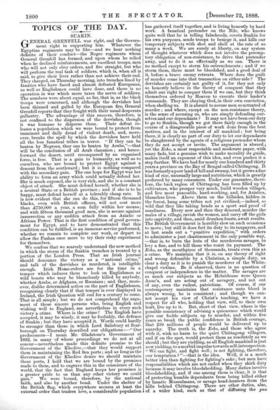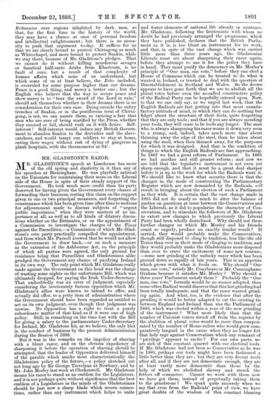TOPICS OF THE DAY.
SlJAKIN.
GENERAL GRENFELL was right, and the Govern- ment right in supporting him. Whatever the Egyptian regiments may be like—and we hear nothing definite of their conduct—the Negro regiments whom General Grenfell has formed, and upon whom he relied. when he declined reinforcements, are excellent troops, men who will not only obey orders, and fire straight, but who will perform the real task of soldiers, which is, when all is said, to give their lives rather than not achieve their end. They charged, on Thursday morning, into trenches lined by fanatics who have faced and. almost defeated Europeans, as well as Englishmen could have done, and. there is no operation in war which more taxes the nerve of soldiers. The numbers were about equal, as far, that is, as the black troops were concerned, and. although the dervishes had been thinned and galled by the European fire, General Grenfell reports that they fought with their usual desperate gallantry. The advantage of this success, therefore, is not confined to the dispersion of the dervishes, though it was humane to disperse them. Their defeat re- leases a population which we were bound to protect from imminent and daily dread of violent death, and, more- over, breaks the spell by which the dervishes have held all the less fanatical tribes in terror. "If they can be beaten by Negroes, they can be beaten by Arabs,"—that will be the conclusion of all Arab clansmen ; and hence- forward the desert, until reconquered by an organised. force, is free. That is a gain to humanity, as well as to ourselves, who are bound to protect Egypt against a descent from the southward ; but it is nothing compared with the secondary gain. The one hope for Egypt was her ability to form an army which could actually defend her. She is much exposed, she is very rich, and she is a constant object of attack. She must defend herself, whether she is a neutral State or a British province ; and. if she is to be happy, must defend. herself at a tolerably cheap rate. It is now evident that she can do this, for fifteen thousand. blacks, even with British officers, will not cost more than X750,000 a year, a sum fully within her means ; and with fifteen thousand good men, she is secure against insurrection or any sudden attack from an Asiatic or African Power. That is the first condition of good govern- ment for Egypt, and to have demonstrated. that this condition can be fulfilled, is an immense service performed, whether we remain to complete our work, or depart to allow the Pashas once more to try their risky experiment for themselves.
We confess that we scarcely understand the new method in which the storm of the Suakin trenches is treated. by a portion of the London Press. That an Irish journal should denounce the victory as a "national crime," and talk of the dervishes as murdered, is intelligible enough. Irish Home-rulers are for the time in a temper which induces them to look on Englishmen as wild beasts who may be blamelessly killed by anybody, whether Arabs, or Afghans, or Russians ; and they, more- over, dislike determined action on the part of Englishmen, recognising clearly that if that temper is ever displayed in Ireland, the Irish Question will end for a century to come. That is all simple ; but we do not comprehend the argu- ment of those sincere persons who, being English and wishing well to England, see nevertheless in every such victory a crime. Where is the crime F The English have accepted, it may be wisely, it may be foolishly, the defence of Suakin ; but they have accepted it. Words could. hardly be stronger than those in which Lord Salisbury at Scar- borough on Thursday described our obligations :—" Our predecessors—I mean Mr. Gladstone's Government of 1882, in many of whose proceedings we do not at all concur—nevertheless made this definite promise to the Government of the Khedive,—that they would. support them in maintaining the Red Sea ports ; and as long as the Government of the Khedive desire we should. maintain these ports, I hold. that we are bound by the promises made to them, and to engrave this in the conscience of the world, that the fact that England keeps her promises is a greater pride to us than any other victory we could gain." We were bound, therefore, by the national faith, and also by another bond. Under the shelter of the British flag, which everywhere secures at least the external order that traders love, a considerable population has gathered itself together, and is living honestly by hard. work. A fanatical pretender on the Nile, who knows quite well that he is telling falsehoods, covets Suakin for his own purposes, sends troops to besiege it, and kills our temporary subjects with shot and shell at the rate of so many a week. We are surely at liberty, on any system of thought whatever which does not involve the peremp- tory obligation of non-resistance, to drive that pretender away, and to do it as effectually as we can. There is no method except to storm his entrenchments ; and if we storm them, there must be bloodshed, and. a good deal of it, before a brave enemy retreats. Where does the guilt of murder come into that transaction on either side ? The dervishes are certainly not guilty of it, for they not only so honestly believe in the theory of conquest that they admit our right to conquer them if we can, but they think themselves ordered by Heaven to execute their leader's commands. They are obeying God, in their own conviction, when shelling us. It is absurd to accuse men so actuated of murder ; and where, except on the non-resistance theory, is the sense of accusing us, who are simply defending our- selves and. our dependants ? It may not have been our duty to go to Suakin, though we got there fairly enough in the course of a disagreeable piece of work done from the best motives, and in the interest of all mankind ; but being there, it is clearly no part of our duty to let our dependants be slaughtered by the agents of a religious pretender whom they do not accept or invite. The argument is absurd ; yet the Echo, a most respectable and moderate paper, with many fads, but a genuine wish to make morality its guide, makes itself an exponent of this idea, and even pushes it a step further. We have had for nearly one hundred and thirty years a province on the Bay of Bengal called Chittagong. It was formerly apoor land of hill and swamp, but it grows afine kind of rice, unusually large and nutritious, which is greatly preferred by many consumers. Under our guarantee, there- fore, the back region of Chittagong has been filled up by cultivators, who prosper very much, build wooden villages, and live most peaceable, hard-working, and, for Asiatics, blameless lives. Above them on the hillsides, hidden in the forest, hang some tribes not yet civilised.,—indeed, so wild. that they like taking heads as a sport and proof of manliness. Every now and then they descend, murder the males of a village, ravish the women, and carry off the girls into captivity, and. then, amid drunken feasts, await results. The British Government is horribly slow on such occasions to move ; but still it does feel its duty to its taxpayers, and at last sends out a "punitive expedition," with orders to administer a just chastisement in the only possible way, —that is, to burn the huts of the murderous savages, to levy a fine, and to kill those who resist its payment. The Echo, as the mouthpiece of thousands, treats even this as a crime. We maintain that it is, on any theory of right and wrong defensible by a Christian, a simple duty, as clear a duty as it is to punish the murderer of the White- chapel victims. Be it observed, there is no question of conquest or independence in the matter. The savages are as much our subjects as the Hebrideans were Queen Anne's, and. are acting out of savagery, and not out of any, even the rudest, patriotism. Of course, if our contemporary maintains that resistance unto blood is always wrong, he is consistent ; and though we can- not accept his view of Christ's teaching, we have a respect for all who, holding that view, will, to their own hurt, live up to it. But, short of that view, where is the possible consistency of advising a quiescence which would. give our feeble subjects up to murder, and within five years so break the public confidence in British courage, that 250 millions of people would be delivered up to anarchy. The truth is, the Echo, and. those who agree with it, wish no harm to the quiet Chittagong villagers, and if on the spot, would protect them as resolutely as we should. ; but they are yielding, as all English mankind is just now yielding, to amorbid impulse towards self-introspection. "We can fight, and fight well ; is not fighting, therefore, our temptation ? "—that is the idea. Well, it is a much better idea than fighting for fighting's sake ; but men have responsibilities which are not ended when they shirk duty because it may involve bloodshedding. Many duties involve bloodshedding, and if one among them is clear, it is that of protecting humble dependants from being killed either by fanatic Mussulmans, or savage head-hunters from the hills behind Chittagong. There are other duties, also, of a wider kind, such as that of diffusing the paz Britanniea over regions inhabited by dark men, so that, for the first time in the history of the world, they may have a chance at once of personal freedom and intellectual enlightenment ; but there is no neces- sity to push that argument to-day. It suffices for us that we are clearly bound to protect Chittagong as much as Whitechapel, and more bound to protect Suakin, while we stay there, because of Mr. Gladstone's pledges. That we cannot do it without killing murderous savages or fanatical half-caste Arabs from Khartoum, is no fault of ours, but a result of that complexity of human affairs which none of us understand, but which some of us at least believe, the Echo included, is overruled for some purpose higher than our dreams. Peace is a good thing, and mercy a better one ; but the English who believe that the way to secure peace and show mercy is to "bear the sword of the Lord in vain," should ask themselves whether in their dreams there is no consideration for their own ease. Dying outside the sultry trenches of Suakin, or in the pestiferous feral of Chitta- gong, is not, we can assure them, so enticing a fate that men who are sure of being scarified by the Press, whether they succeed or fail, should rush on it with desire. Self- interest ! Self-interest would induce any British Govern- ment to abandon Suakin to the dervishes and the slave- catchers, and would tempt our soldiers to stay at home, eating their wages without risk of dying of gangrene in plank hospitals, with the thermometer at 840.











































 Previous page
Previous page